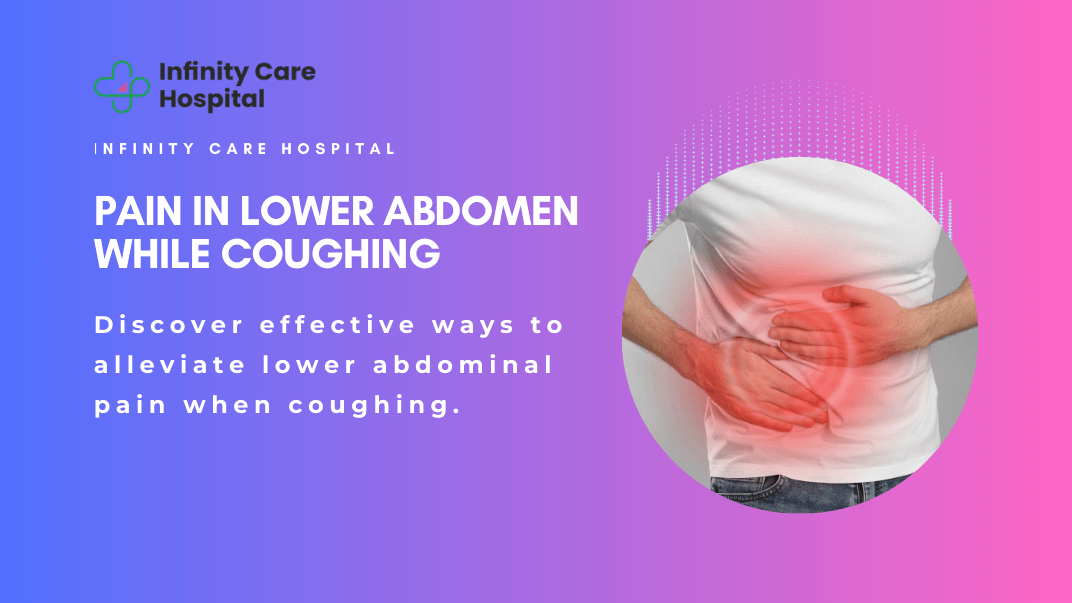Introduction
Have you ever experienced a sharp or uncomfortable pain in your lower abdomen when you cough? If so, you’re not alone. This common issue can be temporary or may signal something more serious, but the good news is there are ways to alleviate it. Understanding why this pain occurs can be the first step toward finding relief. Whether it’s a result of muscle strain, an underlying health condition, or something else, getting to the bottom of this discomfort is crucial for your overall well-being. Stay tuned as we explore the causes of lower abdominal pain during coughing and provide practical tips for easing this annoyance.
Causes of Lower Abdominal Pain During Coughing
Experiencing pain in the lower abdomen when coughing can be unsettling. This discomfort can result from various factors, ranging from mild to severe. Understanding these causes helps in addressing the pain effectively.
Muscle Strain
One of the most common reasons for experiencing lower abdominal pain during a cough is muscle strain. The muscles in the abdomen work together to support the spine and help with movement. Coughing repeatedly can strain these muscles, leading to pain and discomfort. This is particularly true for intense coughing bouts, as they put considerable pressure on the abdominal muscles, causing them to stretch and sometimes even tear slightly. Simple rest and applying heat can often alleviate this discomfort.
Hernia
Another cause for concern is a hernia, specifically an inguinal hernia, which occurs when part of an organ or tissue pushes through a weak spot in the abdominal muscle wall. The pressure from coughing can exacerbate this condition, leading to noticeable pain in the lower abdomen. In some cases, a visible bulge may appear, worsening with coughing or straining. Hernias can require surgical intervention, so it’s crucial to see a doctor if this is suspected.
Medical Conditions Associated with Lower Abdominal Pain and Coughing
Certain medical conditions can manifest with lower abdominal pain and coughing as symptoms. Recognizing these conditions is vital for early detection and treatment.
Appendicitis
Appendicitis, an inflammation of the appendix, can cause sharp pain in the lower right part of the abdomen. While coughing, the jolt to the body can intensify this pain, making it more noticeable. Appendicitis often requires urgent medical attention, as a burst appendix can lead to life-threatening complications. Other symptoms may include fever, nausea, and vomiting, signaling the need for immediate medical evaluation.
Diverticulitis
Diverticulitis is another condition that might cause pain in the lower abdomen when coughing. This condition involves the formation of small pouches, known as diverticula, in the walls of the colon. When one or more of these pouches become inflamed or infected, it can lead to sharp, cramping pains in the lower abdomen, often exacerbated by coughing. Treatment typically involves antibiotics and a temporary change in diet, but severe cases may require hospitalization.
Urinary Tract Infections
Urinary tract infections (UTIs) can also be linked to lower abdominal pain, which may become more pronounced when coughing. A UTI occurs when bacteria enter the urinary tract, leading to infection and inflammation. Symptoms often include a strong, persistent urge to urinate, a burning sensation when urinating, and cloudy or strong-smelling urine. While not directly caused by coughing, the act can increase discomfort associated with the UTI. Prompt treatment with antibiotics is effective in clearing up these infections.
Understanding the various reasons behind lower abdominal pain when coughing is crucial for addressing the issue properly. Whether the pain is due to something as straightforward as a muscle strain or as serious as appendicitis, recognizing the symptoms and seeking timely medical attention can make a significant difference in outcome and relief.
Tips for Alleviating Lower Abdominal Pain When Coughing
Experiencing pain in your lower abdomen when you cough is more than just uncomfortable—it can significantly disrupt your day. Whether the pain is sharp and sudden or a dull ache, finding relief is likely at the top of your priorities. Here are a few strategies that can help minimize this discomfort.
Proper Coughing Technique
Believe it or not, there’s a right way to cough! A proper coughing technique can help reduce the strain on your abdominal muscles and, consequently, alleviate pain. When you feel a cough coming on, try to brace your abdomen with your hands or a soft pillow. This added support can protect your muscles and make coughing less painful. Additionally, standing or sitting up straight when you cough can also help by reducing the pressure on your lower abdomen.
Warm Compress
Applying a warm compress to your lower abdomen can be a simple yet effective way to ease the pain. The warmth helps relax the abdominal muscles, reducing tension and discomfort. You can use a warm towel, heating pad, or even a hot water bottle, placing it on the area for 15-20 minutes at a time. Make sure the temperature is warm and not too hot to avoid skin irritation.
Over-the-Counter Pain Medication
For those times when the pain is a bit more stubborn, over-the-counter (OTC) pain medications can provide relief. Nonsteroidal anti-inflammatory drugs (NSAIDs) like ibuprofen (Advil, Motrin) or acetaminophen (Tylenol) can help reduce inflammation and ease pain. However, it’s essential to use these medications as directed and consult with a healthcare provider if you’re unsure about what’s best for you or if you’re taking other medications.
Home Remedies for Relief
Sometimes, the comfort of a home remedy can be just what you need to ease lower abdominal pain when coughing. Here are a few options that are both soothing and effective.
Ginger Tea
Ginger is renowned for its anti-inflammatory properties, which can be particularly beneficial if your abdominal pain is due to inflammation. To make ginger tea, slice a piece of fresh ginger and steep it in boiling water for 10-15 minutes. You can add honey or lemon to taste. Drinking a warm cup of ginger tea can help soothe your stomach and reduce discomfort.
Peppermint Oil
Peppermint oil is another natural remedy known for its ability to relax muscles and ease pain. Dilute a few drops of peppermint oil with a carrier oil, such as coconut or olive oil, and gently massage it onto your lower abdomen. The soothing scent of peppermint also serves as a natural way to relax, which can further help in reducing pain.
Rest and Relaxation
Never underestimate the power of rest and relaxation in healing and pain relief. When you’re experiencing lower abdominal pain, taking time to rest can be incredibly beneficial. Try lying down in a comfortable position and practicing deep breathing or meditation to help relax your body. Ensuring you get enough sleep and avoiding activities that put additional strain on your abdomen can also help in the recovery process.
By incorporating these tips and home remedies, you should find yourself better equipped to manage and alleviate pain in your lower abdomen when coughing. Remember, if the pain persists or worsens, it’s crucial to seek medical advice as it may be a sign of a more serious condition.
When to Seek Medical Attention for Lower Abdominal Pain While Coughing
Most of the time, experiencing a bit of discomfort or pain in the lower abdomen while coughing can be due to non-serious reasons such as muscle strain. However, there are certain instances where this symptom may signal something more concerning that requires medical attention. It’s always better to be safe and informed about when to seek help.
Persistent Pain
If the pain in your lower abdomen persists for more than a few days, it’s important to consult a doctor. Persistent pain, especially if it doesn’t improve with rest or over-the-counter pain relievers, could indicate an underlying condition that needs medical evaluation.
Severe Pain
Any sudden, severe pain in the lower abdomen that arises when you cough should not be ignored. Severe pain might be a sign of an acute condition, such as appendicitis or a hernia, that could require immediate medical intervention.
Accompanying Symptoms
In some cases, other symptoms accompanying the pain can be a red flag. Watch out for:
– Fever or chills
– Nausea or vomiting
– Blood in urine or stool
– Difficulty urinating
– Unexplained weight loss
These symptoms, combined with lower abdominal pain, could indicate a more serious problem like an infection, kidney stones, or other conditions that warrant a visit to your healthcare provider.
Changes in Pain Intensity
Pay attention to changes in the intensity of your pain, especially if it grows worse when you move or try to carry out your daily activities. An increase in pain intensity might suggest complications such as an internal injury.
Understanding when to seek medical attention for lower abdominal pain while coughing is crucial. It helps you act swiftly in situations that require prompt medical care, ensuring your health and well-being are safeguarded. If in doubt, it’s always better to err on the side of caution and consult a healthcare professional.
Conclusion
Experiencing pain in your lower abdomen when coughing can be distressing, but it’s often manageable with the right approach. Remember, it’s essential to listen to your body. If the pain is persistent or severe, seeking medical advice can’t be understated. Often, this pain is a symptom rather than a condition itself and addressing the root cause can provide real relief.
In the meantime, practicing good posture, staying hydrated, incorporating gentle stretching, and using over-the-counter pain relief can make a significant difference. Your health is invaluable, and taking proactive steps to manage symptoms can enhance your quality of life. Remember that you’re not alone in this; countless people experience similar issues and successfully manage their symptoms with lifestyle adjustments and proper medical care.
Finding the right balance of treatment and self-care is key. Always prioritize your well-being and don’t hesitate to reach out for support when you need it. Here’s to better health and breathing easier, without the worry of pain.




